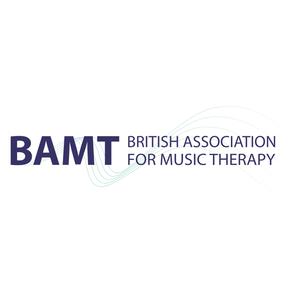
Music Therapy Conversations
Luke Annesley
- 1 hour 2 minutesEp 93 Colin Lee
Colin Lee talks to Martin Lawes about his musicology-oriented approach as a Nordoff-Robbins trained music therapist, and about the newly published Oxford Handbook of Queer and Trans Music Therapy which he edited. The podcast begins and ends with music. To start with, a composition by a music therapist commissioned to begin the handbook. To conclude, an improvisation from a music therapy session where Colin explains his musical decision-making as a therapist. Colin Andrew Lee studied piano at the Nordwestdeutsche Musikakademie and subsequently earned his postgraduate diploma in music therapy from the Nordoff-Robbins Music Therapy Centre, London, UK. Colin was awarded the Music Therapy Charity research fellowship completing his doctoral thesis on the analysis of improvisations with people living with HIV/AIDS at London Lighthouse, a center for people facing the challenge of AIDS. He continued his clinical work at Sir Michael Sobell House Hospice, Oxford, UK. After immigrating to North America, Colin taught at Berklee College of Music, Boston, USA, and later at Wilfrid Laurier University, Waterloo, Canada. Following the publication of Music at the Edge: The music therapy experiences of a musician with AIDS (1996, 2016), he subsequently created the theory of aesthetic music therapy that was the subject of Colin's monograph, The Architecture of Aesthetic Music Therapy (2003). Colin recently edited The Oxford Handbook of Queer and Trans Music Therapy (2024), and is currently editing The Oxford Handbook of Improvisation in Music Therapy. His research interests also include the analysis of postminimalist composers and their influence on the study of applied health musicology.
References Lee, C. A. (2024) The Oxford Handbook of Queer and Trans Music Therapy. Oxford University Press. https://doi.org/10.1093/oxfordhb/9780192898364.001.0001 Lee, C. A. & Dromey, C. (2023). Towards an applied health musicology: Aesthetic music therapy and beyond. In C. Dromey (Ed.), The Routledge Companion to Applied Musicology (pp. 184-191). Routledge. https://doi.org/10.4324/9781003042983
17 December 2024, 11:30 pm - 56 minutes 44 secondsEp 92 Tilly Mütter at BAMT 2024
Tilly Mütter has repeated her roving reporter trick from EMTC 2022. This time she talks to various conference attendees at the BAMT conference in Leicester in May 2024, providing a variety of interesting perspectives on the weekend. the theme of the conference was 'About All of Us, For All of Us, By All of Us', with the primary aims of highlighting and promoting the development of Music Therapy. There are some familiar voices here (to Music Therapy Conversations listeners) along with some new ones. In order of appearance, Tilly spoke to: Naviella Dowds, Anthony Voelcker, Kelly Fraser, Duncan Campbell, Marianne Rizkallah, Helen Odell-Miller, Hakeem Leonard, Kirsty Jane, Kendra Bodden and Karen Diamond. A big thanks to all of these contributors! Before that, Tilly and Luke also share their own (somewhat hazy) recollections in the introduction. You can find another view from Marianne Rizkallah on her blog here, and no doubt there are more conference reports incoming. There were some fresh faces at this conference, new formats, and many inspiring moments, in a different sort of venue - plenty to reflect on and learn from!
26 November 2024, 11:30 pm - 1 hour 9 minutesEp 91 - Crystal Luk-Worrall
In episode 91, Davina speaks to Crystal Luk-Worrall about EMDR and music therapy. Crystal Luk-Worrall is a music therapist and EMDR therapist working with the adoption community in London through her private practice Clap and Toot, as well as working with bereaved families through her work at Shooting Star Children’s Hospices. She enjoys exploring multi-modality practice and systemic practice. Crystal also supports fellow freelance therapists and newly qualified therapists through her role as BAMT’s freelance network coordinator.
29 October 2024, 11:30 pm - 1 hour 3 minutesEp 90 Helen Wallace-Bell
In this podcast, Martin Lawes talks to Helen Wallace-Bell about SMI and RMI which are part of the contemporary spectrum of Guided Imagery and Music (GIM) and Music and Imagery (MI) methods
Helen explains what these approaches are and how the recorded music used is chosen collaboratively to help the client develop their inner resources or work on issues. Helen is involved in MI training which also gets discussed. In addition, Helen talks about her work with clients who have PTSD and about online groupwork with carers. She discusses various music used in this work including Breezin’ (George Benson, https://open.spotify.com/track/1m3BAsNsQAaSNMD2M6vlKY?si=af7875cabc884295), Angels Nest (Peter Kater, https://open.spotify.com/track/3ijj6aeXCKMZWsD0EdzneJ?si=ce6f4f6551184195), and Darkest Hour (Sevdaliza, https://open.spotify.com/track/0ZbHjO6HyoGMLq5dCQIYWm?si=f41ece3b7bf64b45).
The podcast begins with Martin explaining how GIM in contemporary practice is a spectrum of different methods and approaches including MI. He outlines what the Bonny Method of GIM is, as the original GIM method, and how MI has been developed in part to meet the needs of clients where GIM is contra-indicated or is in other ways unsuitable. For music therapists wishing to use GIM with their existing clients, the MI methods are especially important.
Helen Wallace-Bell, MA, BA (Hons), FAMI, MIT(Dip.), IMBP(Dip.) trained as a Music Therapist at the University of Roehampton, qualifying in 2007. She then worked for many years with adults with a learning disability. During this time, Helen began training in GIM, an experience she found transformative and enlightening both professionally and personally. She is now a GIM Fellow and MI Therapist (MIT) working in mental health, trauma, personal development, and group work (https://www.routesforchange.uk/). She is also an Independent Music Breathing Practitioner, Assistant Trainer and Supervisor at The Integrative GIM Training Programme (www.integrativegim.org), and a BAMT registered supervisor.
Helen’s GIM training cohort were the first to be trained in SMI and RMI in the UK and she is passionate about the efficacy and value of MI as a therapy process. She has presented case studies at a number of conferences, including sharing the results of an SMI groupwork pilot project undertaken with music therapy organisation Whole Step CIC during Covid-19 lockdowns, and her own experience as a trainee using MI to process transference/counter-transference.
In her spare time, Helen enjoys living by the sea, and is a singer, songwriter, and percussionist in a folk trio.
References
Wallace, H. (2010) 'An Inquiry into an Integrated Approach to Music Therapy for Children with Autistic Spectrum Disorder & Sensory Integration Dysfunction'. MA research project, Roehampton University (unpublished).
Margetts, L., Wallace, H. & Young, E. (2013) 'A Potential Space: Approaching "Outsider Research" with Classroom Practitioners working with Children with Complex Needs in Belarus', British Journal of Music Therapy, Vol.27, 2 p.6-23 (Co-Author)
Wallace, H. (2018) 'A Whirlwind of Being', Music & Imagery Therapy Case Study outlining MI to process transference/counter-transference), presented at the 13th European GIM Conference, European Association of Music and Imagery (EAMI)
Wallace, H (2021) 'Containment Through Collaboration: Online Therapy During Lockdown - A Pilot Project', Music & Imagery Therapy Groupwork Case Study, presented as part of a roundtable (Supportive Music & Imagery: Integrating Artwork & Imagery into Music Therapy practice), at The British Association for Music Therapy's annual conference (theme: 'Open Ground: Music Therapy in Collaboration & Exchange)
Wallace, H (2022) 'The Way We Were: A multi-method approach to Music Therapy to support an adult with Learning Disability through bereavement', Music Therapy & Music & Imagery Therapy Case Study, presented at the 12th European Music Therapy Conference (theme: 'Music Therapy in Progress - Please Disturb')
Wallace, H (2022) 'Online Group Music & Imagery Therapy During Lockdown', presented as part of a roundtable (The Use of Music & Imagery Methods as stand-alone interventions and as part of the continuum model), at the 12th European Music Therapy Conference
Wallace, H. & Jakubauskas, R. (2022) 'A Sense of Belonging: Piloting an online Supportive Music & Imagery Therapy Group for Adult Carers during Covid-19', poster presentation at the 12th European Music Therapy Conference
Wallace, H (2022) 'Reclaiming Jocelyn: One Woman's Journey Back to her Self through Music & Imagery Therapy', poster presentation at the 12th European Music Therapy Conference
Wallace, H, & Jakubauskas, R (2023) 'Piloting Online Group Music & Imagery Therapy for Adult Carers during Covid-19', poster presentation at the World Federation of Music Therapy World Congress of Music Therapy
24 September 2024, 10:30 pm - 53 minutes 47 secondsEp 89 Emi Booth
Emi talks with Davina about their recent debut at the BAMT Conference in May 2024 where they spoke about their experiences of being a deaf music therapist.
Here are Emi's words of introduction:
My name’s Emi and my pronouns are they/them. I’m a deaf music therapist who currently works in older people’s mental health in the NHS. I graduated from the University of Derby in 2022 with my master’s in music therapy, where I became passionate about making music therapy more accessible to deaf people. Ever since, I’ve been working on publishing my independent scholarship on how my experience of music impacts my work, and I hope to use my career and research to platform the different ways disabled folks access music and music therapy.
27 August 2024, 10:30 pm - 1 hour 28 minutesEp 88 BAMT Conference 2024 Roundtable Discussion
This is the recording of the live discussion from the BAMT conference at the Curve Theatre Leicester on 18 May 2024. The conference panel was Luke Annesley, Rachel Darnley-Smith, Tilly Mutter and Davina Vencatasamy. Surprise special guests were Wendy Magee and Joy Gravestock, who happened to be in the audience, and excerpts were included from previous episodes from Wendy and Joy, along with Denise Wong and Mercedes Pavlicevic. The episode includes discussion about the genesis of the podcast, the processes of interviewing and being interviewed, and closer examination of excerpts from episodes selected by the panellists. Thanks to everyone who attended in person, and to BAMT for a wonderful and enriching conference.
23 July 2024, 10:00 pm - 1 hour 16 minutesEp 87 Karen Goodman
Karen D. Goodman, PhD., Professor Emerita of Music, Montclair State University, Montclair, New Jersey, USA., has been the primary figure in designing and developing both the former undergraduate and graduate music therapy programs at Montclair over forty years. Professor Goodman’s research-based clinical work, at ten clinical settings, includes music therapy practice in child and adult psychiatry and developmental disabilities at New York Hospital- Cornell Medical Center, Creative Arts Rehabilitation Center-NYC and educational programs in the Greater New York area.
Currently an Associate Editor for Psychology of Music, Professor Goodman has served as Editor of Music Therapy: The Journal of the American Association for Music Therapy and other journals in education. Her publications include two widely acclaimed books: Music Therapy Groupwork with Special Needs Children: The Evolving Process (2007) and Music Therapy Education and Training: From Theory to Practice (2011) as well as two edited books International Perspectives in Music Therapy Education and Training: Adapting to a Changing World (2015) and Developing Issues in Music Therapy Education and Training: A Plurality of Views (2023). A frequent presenter at international music therapy conferences over many years, she lectures and consults internationally on topics related to her clinical work and higher education and the relationships between these, most recently her lifespan developmental stage model for music therapy supervision (Goodman, 2023). Her outreach services for clinical supervision, program design, editing, teaching and both book and grant review are described here: karendgoodmanconsulting.com
References
Arieti, S., (1955) Interpretation of schizophrenia.
Goodman, K.D. (2023) The Music Therapy Supervisor: Developmental Perspectives. Aalborg, Denmark: Aalborg University
Goodman, K.D. (Ed.) (2023) Developing Issues in World Music Therapy Education and Training. Springfield, Illinois: Charles C Thomas Publisher.
Goodman, K.D. (Ed.) (2015) International Perspectives in Music Therapy Education and Training: Adapting to a Changing World. Springfield, Illinois: Charles C Thomas Publisher.
Goodman, K.D. (2011) Music Therapy Education and Training: Theory to Practice. Springfield, Illinois: Charles C Thomas Publisher.
Goodman, K.D (2007) Music Therapy Groupwork with Special Needs Children: The Evolving Process. Springfield, Illinois: Charles C Thomas Publisher.
Goodman, K.D. (2015) Book Publication in Music Therapy (In) K.D. Goodman (Ed.) International Perspectives on Music Therapy Education and Training: Adapting to a Changing World. Springfield, Illinois: Charles C Thomas.
Kaufman, D. L. & Goodman, K.D. Cracking Up and Back Again: Transformation through Music and Poetry. In Z. Li & T.L. Long, (Eds.) (2010) The Meaning Management Challenge: Making Sense of Health, Illness and Disease, Oxford, UK: Inter-Disciplinary Press, pp. 117-129.
Goodman, K.D. (1981) Music Therapy, Chapter 29. In S. Arieti (Ed.) The American Handbook of Psychiatry. New York: Basic Books
Goodman, K.D. (2008) Cracking Up and Back Again: Book Review. Arts in Psychotherapy. 35(2)
Goodman, K.D. (1989) Music Therapy Evaluation of Emotionally Disturbed. Children. Arts in Psychotherapy. 16(2), 179-192.
Goodman, K.D. (1986) Book reviews. Journal of Music Therapy, 23 (1).
25 June 2024, 10:30 pm - 59 minutes 34 secondsEp 86 Holly Shirra
Holly Shirra is a qualified music therapist who holds her focus on helping people connect in community and express themselves creatively and authentically. With classical piano training from a young age, Holly discovered a passion for free improvisation while studying music therapy, which she completed in 2020.
To help her understand further how people spontaneously create in groups, Holly founded 'Cambridge Music Improv' - a community project that gathers people from diverse backgrounds in public spaces to improvise music together. This supportive environment allows participants to tap into their creative side and find catharsis and self-expression while building connections with others.
Alongside her community work, Holly has extensive experience in musical education, teaching piano to children since the age of 15. She continues to share her love of music through teaching as a regular part of her work.
In her spare time these days, Holly likes to find balance through cooking, rock climbing, meditation, and spending time in nature.
Here is a link to Holly's documentary about the group:
28 May 2024, 10:30 pm - 1 hour 4 minutesEp 85 Jessica Leza
Jessica Leza is a board-certified music therapist, author, and multimedia artist. She graduated with a Bachelor of Music in Music Composition from the University of North Texas and a Master of Arts in Music Therapy from Texas Woman’s University. Leza’s music therapy scholarship and advocacy centers around neurodiversity, disability justice, culture, and LGBTQ+ liberation and includes publications in The Neurodiversity Reader, Sociocultural Identities in Music Therapy, and The Oxford Handbook of Queer and Trans Music Therapy, as well as the solo-authored An Introduction to Neurodiversity and Autistic Culture for (Music) Therapists. Leza’s multimedia works have been showcased in film and arts festivals across the US and Europe, China, and South America.
Luke and Jessica discussed her process of becoming a music therapist and her recent experiences of clinical practice, followed by the concepts of neuroqueering and neurocosmopolitanism as they might apply to music therapy.
e-Book: https://www.etsy.com/listing/1492591757/an-introduction-to-neurodiversity-and
Paperback: https://www.etsy.com/listing/1510338925/paperback-an-introduction-to
References
Hadley, S. 2021 Sociocultural Identities in Music Therapy. United States: Barcelona Publishers.
Lee, C. 2024 Oxford Handbook of Queer and Trans Music Therapy. United Kingdom: Oxford University Press, USA.
Leza, J. (n.d.). An Introduction to Neurodiversity and Autistic Culture for (Music) Therapists. United States: La Migdalia Press.
Walker, N. (2021). Neuroqueer Heresies: Notes on the Neurodiversity Paradigm, Autistic Empowerment, and Postnormal Possibilities. United States: Autonomous Press.
23 April 2024, 10:30 pm - 1 hour 1 minuteEp 84 Den Vecchio
Luke talks to Den Vecchio, a play therapist living and working in Bristol, UK. They discuss the principles of play therapy, why play therapy has become more available in mainstream schools in recent years, and overlaps with music therapy practice. Also - why every play therapist should have snakes, spiders and crocodiles in their collection!
Den is a thoughtful practitioner and was a very entertaining and engaging podcast guest. As a music therapist, you're perhaps unlikely to have come across her, but don't let this discourage you from listening to this fascinating episode. There's lots of food for thought here, in particular for music therapists who work with children and young people.
Den Vecchio's website: https://thegardenroombristol.com/author/denvecchio/
References
Axline, V. M. (1975). Dibs: In search of self. Mansion.
26 March 2024, 11:30 pm - 58 minutes 47 secondsEp 83 Evelyn Mason
Evelyn Mason is an experienced music therapist and Vice-Chancellor’s PhD Student at the Cambridge Institute for Music Therapy Research at Anglia Ruskin University (ARU) in Cambridge. Chroma Therapies and the Independent Neurorehabilitation Providers Alliance (INPA) are collaborating with ARU on this study which focuses on music therapy to address the emotional challenges of family caregivers of people with Huntington’s disease. As a practising clinician, she has specialisms in brain injury rehabilitation, adoption, dementia, learning disability and hospice care.
Having completed her MA Music Therapy training at ARU in 2008, she worked for the Northern Ireland Music Therapy Trust in Belfast, with children with learning difficulties in Chennai, India, for Methodist Homes Association (MHA) in central England, for Chroma Therapies with individual adoption cases, and currently works with Chroma Therapies as a Neurologic Music Therapist at a brain injury rehabilitation unit in Bristol.
Evelyn employs an integrative approach in her clinical work. At times, she uses psychodynamic processes at the pre-assessment phase to understand relational or engagement issues with the client. Evelyn seeks to adopt a desire-based approach by putting the client’s choices at the core of the therapeutic journey. She works within the scientific theory model when carrying out her rehabilitation work, seeking to enable the client to benefit from inter-disciplinary working and patient-centred rather than discipline-centred programs.
Evelyn's future research interests are related to the field of neuro-disability. They include:
- Developing musical techniques to address neurologically-induced sensations.
- Examining music therapy techniques to address speech deficits in stroke patients diagnosed with aphasia.
- Analysing connections between social issues and acquired brain injury.
- Developing online music therapy models for carers of people with neurodegenerative conditions.
References/links:
The Academy of Neurologic Music Therapy – -In Memory of Robert F. Unkefer (nmtacademy.co)
https://nmtacademy.co/wp-content/uploads/2016/04/nmt-definitions.pdf
Bruscia, K.E. (2014) Defining music therapy. 3rd ed. Gilsum, NH: Barcelona Publishers.Rolvsjord, R. (2016) Resource-Oriented Perspectives in Music Therapy. Oxford University Press.
Thaut, M. and Hœmberg, V. (2016) Handbook of neurologic music therapy. Oxford: Oxford University Press.
20 February 2024, 11:30 pm - More Episodes? Get the App
Your feedback is valuable to us. Should you encounter any bugs, glitches, lack of functionality or other problems, please email us on [email protected] or join Moon.FM Telegram Group where you can talk directly to the dev team who are happy to answer any queries.
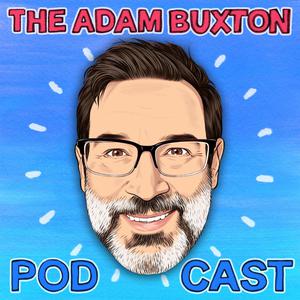 THE ADAM BUXTON PODCAST
THE ADAM BUXTON PODCAST
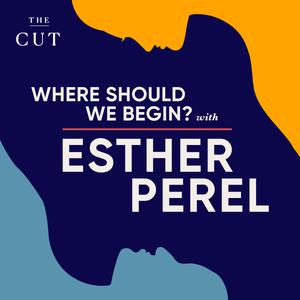 Where Should We Begin? with Esther Perel
Where Should We Begin? with Esther Perel
 Off Menu with Ed Gamble and James Acaster
Off Menu with Ed Gamble and James Acaster
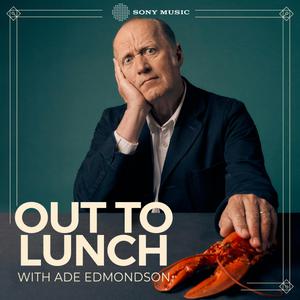 Out To Lunch with Ade Edmondson
Out To Lunch with Ade Edmondson
 On Being with Krista Tippett
On Being with Krista Tippett
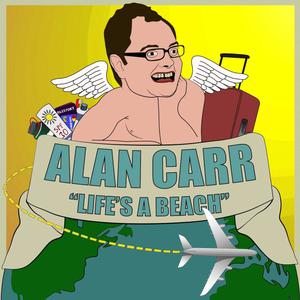 Alan Carr's 'Life's a Beach'
Alan Carr's 'Life's a Beach'